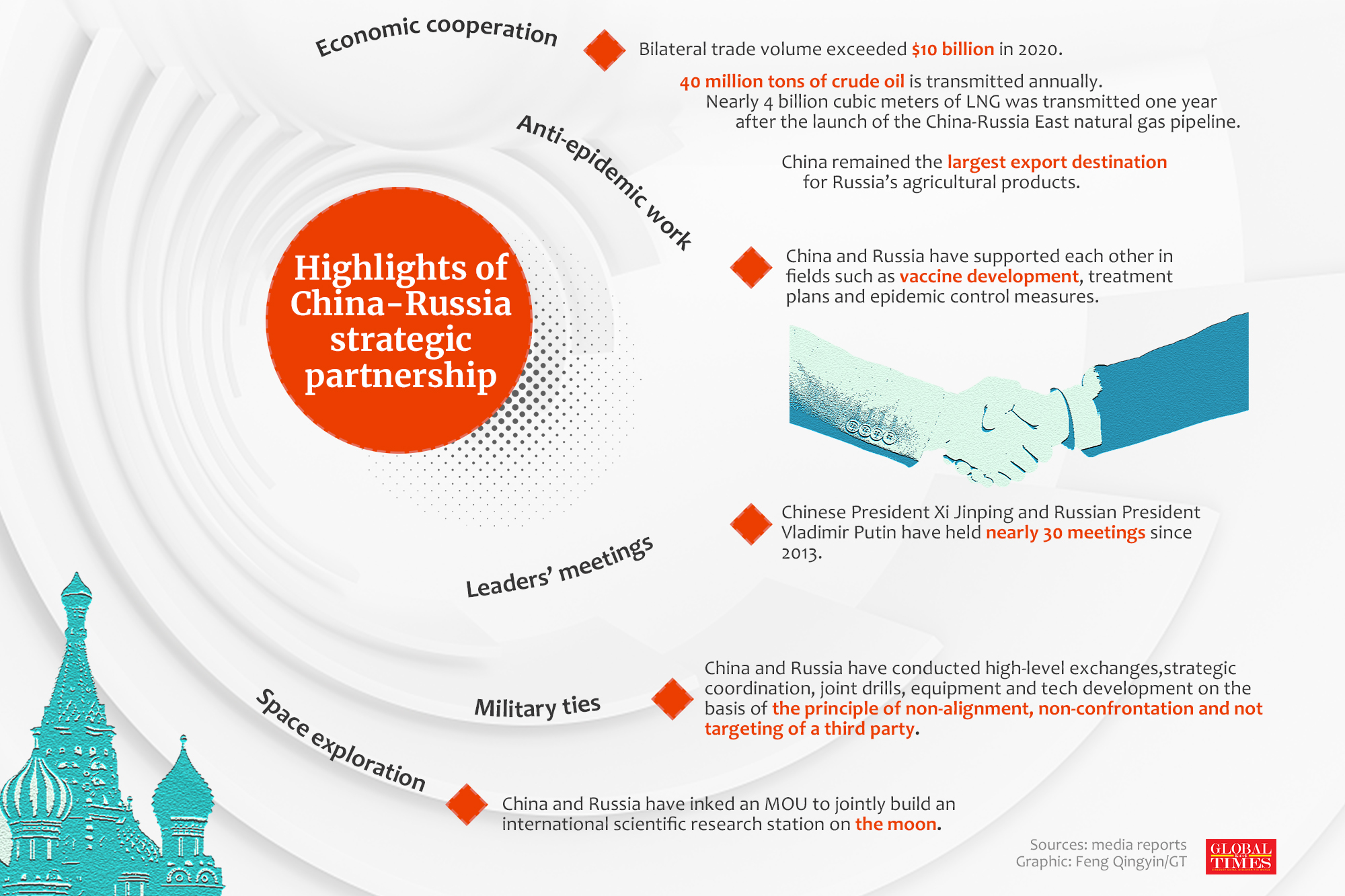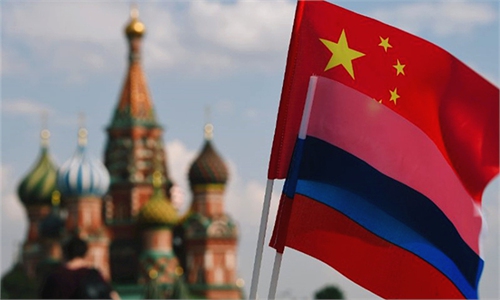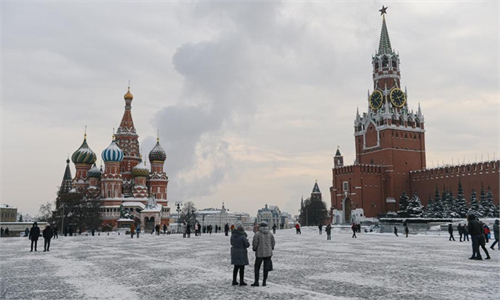China-Russia partnership 'key to balance US hegemony'
Promoting settlement of local currency to replace US dollar 'important for risk avoidance'

Chinese State Councilor and Foreign Minister Wang Yi (right) meets with Russian Foreign Minister Sergei Lavrov in Guilin, a scenic city in South China's Guangxi Zhuang Autonomous Region on Monday. Photo: AFP
As Russian Foreign Minister Sergei Lavrov arrived in China for his two-day visit on Monday, just two days after the China-US meeting in Anchorage, Alaska, Chinese experts said it's pretty normal for the two like-minded partners to coordinate crucial information, but it doesn't mean the two major powers are forming an anti-US alliance because this would be unnecessary and outdated.Chinese State Councilor and Foreign Minister Wang Yi met Lavrov in Guilin, a popular tourist city in South China's Guangxi Zhuang Autonomous Region, on Monday. The atmosphere of the meeting was different from the intense China-US Anchorage meeting. Lavrov enjoyed a boat ride on Lijiang River, a beautiful scenic spot, before he arrived at the venue for his meeting with Wang.
Both sides have informed each other about the latest development of their ties with the US. The two foreign ministers urged the US to rethink the damage it has caused to the international peace.
The two foreign ministers said the US should stop its bullying activities, stop interfering in other countries' internal affairs, and stop forming cliques to confront other countries. All countries should follow the principle of the UN Charter to boost democratization of international relations.
The two foreign ministers also discussed the Iranian nuclear deal, Afghan peace process, Myanmar situation, Syria, climate change and UN reform, according to a statement from the Chinese Foreign Ministry.
Wang also greeted Lavrov with an elbow bump, which replaced a handshake amid the COVID-19 pandemic, but the elbow greetings didn't happen between Chinese and US chief diplomats in Anchorage.
Some Chinese netizens guess that choosing Guilin to receive Lavrov and the Russian delegation is because "Guilin" in Chinese is homophonic to the meaning of a "honorable neighbor."
The development of China-Russia ties does not target any particular country, and the bilateral relationship is open and aboveboard, unlike the cliques with hidden conspiracies seen in a few other countries, a Chinese Foreign Ministry spokesperson said on Monday.
Spokesperson Hua Chunying made the remarks at a routine press briefing in response to a question on whether Lavrov's visit to China is an intentional arrangement made after the China-US high-level strategic dialogue in Alaska.
Chinese analysts said China and Russia will exchange their opinions and stances, as well as concerns on many international issues, and will cooperate on diplomacy, politics and security, and China's recent dialogue with the US is one of the topics that both sides share interests.
The more unstable the world is, the greater the need for China-Russia cooperation to continue, Hua noted. "China and Russia, standing shoulder to shoulder with close cooperation and firm opposition to hegemony and bullying, have been a pillar of world peace and stability," she said.
After the Alaska meeting with the US, China on Monday not only engaged with Russia but also made an exchange with North Korea, which also pays high attention to US acts and policies on foreign affairs. China has reaffirmed its stance to uphold the political settlement of the Korean Peninsula issue, and to preserve peace and stability on the peninsula.
Chinese analysts said the US' policy on the Korean Peninsula and its actions will bring direct and crucial impact to many countries in the region, and when the US treats these countries as threats, the US is also becoming a treat to them. China, as a trustworthy and powerful partner of these countries, has the responsibility to make sure its partners or neighbors with close ties are informed about its significant dialogue with the US, which had touched upon many international issues.
This shows that it's unrealistic for the US to dominate the Korean Peninsula issue by engaging only with its ally South Korea, they said.
Anti-US alliance?

Highlights of China-Russia strategic partnership: -Nearly 30 meetings between the two countries' leaders since 2013 -Bilateral trade volume exceeded $10b in 2020 -A joint international scientific research station on the moon to be built
2021 marks the 20th anniversary of the signing of Treaty of Good-Neighborliness and Friendly Cooperation Between the People's Republic of China and the Russian Federation, and both sides have agreed to renew the treaty, with the principle of non-alliance.Ji Zhiye, former head of the China Institutes of Contemporary International Relations, told the Global Times on Monday that the two countries have agreed to renew the treaty, which means they don't want to sign a new treaty of alliance, so the West should not be oversensitive of the China-Russia strategic partnership.
Although the two countries are not going to align with each other, China and Russia still need to deal with their common threats together based on the flexible partnership, as the US has created many challenges, such as sanctions and interference into regional affairs, to interrupt the development of the two countries, experts said.
In a group interview with Chinese media ahead of his visit, Lavrov called for strengthening the autonomy of the science and technology industry, promoting the settlement of the local currency and other international currencies that can replace the US dollar and gradually move away from the Western-controlled international payment system, so that the risks posed by US or Western sanctions against Russia and China can be reduced.
"Russia's suggestion will receive a positive response from China as both sides have already realized the huge risk of overreliance on the US dollar and Western-controlled payment system" since the financial crisis in 2008, and the latest massive quantitative easing done by the US for boosting its own economy also increased such concern, said Yang Jin, an expert on China-Russia relations with the Chinese Academy of Social Sciences in Beijing.
Promoting the settlement of local currency is a trend for the economies worldwide, and when the US withdrew from the Iranian nuclear deal, the EU's core members have also considered to establish a new payment system to bypass SWIFT controlled by the US, Yang said.
"Washington has been abusing SWIFT to arbitrarily sanction any country at will, which sparked global dissatisfaction. If China and Russia could work together to challenge the dollar hegemony, a laundry list of countries would echo the call and join the new system," Dong Dengxin, director of the Finance and Securities Institute at the Wuhan University of Science and Technology, told the Global Times on Monday.
As the payment system is linked to the trading system, Dong suggested that the new payment system use the yuan as the clearing currency.
A number of Russian banks have joined the China International Payment System to facilitate bilateral trade settlements, the Russia Today reported.
"At first, the system could push forward a trial run in Central Asian countries and countries and regions along the routes of the Belt and Road Initiative (BRI). As its influence grows, the system is poised to draw in other countries in Europe and ASEAN," Dong said.
But he cautioned that Washington may obstruct the move by making SWIFT "exclusive," meaning that the US will force countries already joining SWIFT to take sides.
Complementary ties
Wang said at a press conference earlier this month that China will cooperate with Russia to fight "color revolutions" and disinformation to better safeguard their national security and political security. Chinese experts said these threats are also mostly incited or created by Western countries, especially the US, and they are not just targeting China and Russia, but also their neighbors and partners.
Yang said when China tried to promote its cooperation with other countries along the routes of the BRI, one of the major concerns is that the projects with huge inputs could be ruined by just one "color revolution" or political turmoil within its partner country.
Russia is also suffering from such a problem, the similar challenges happen frequently around Russia in regions like Eastern Europe and Central Asia, which seriously affects Russia's interests, experts said.
Although the size of the Russian economy is relatively not big, it has inherited the advantages in international security and military from the former Soviet Union, so it has a significant influence on intelligence or military in many regions like the Middle East, Central Asia and Europe, which are all key regions of the BRI proposed by China, Yang said, noting that cooperation with Russia could ensure the safety of Chinese investments and the development of many countries in those regions, "to protect them from the harm of the 'color revolutions' instigated and backed by the US," he said.
Not just in diplomacy and security, China and Russia trade ties will also be boosted amid the COVID-19 pandemic and the US sanctions, said Xiao Bin, an associate research fellow at the Chinese Academy of Social Sciences' Institute of Russian, Eastern European and Central Asian Studies.
He predicted that China-Russia trade will continue to rise in the next few years, with the services trade taking the lead.





